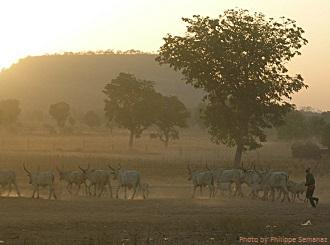
Addis Ababa, Ethiopia 26 May 2014 (ECA) - During a workshop hosted by the African Climate Policy Centre (ACPC) for the African Group of Negotiators on the 12-14 May 2014, participants concurred that prospects of capping temperature rise to 2 degrees above pre-industrial levels is already looking bleak, given the pace of climate change negotiations. Unfortunately, according to recent Intergovernmental Panel on Climate Change (IPCC) fifth assessment working group reports, upheavals await humanity should this projection come to pass. The IPCC working group II report posits with high confidence that food security, already a challenge to vulnerable groups in Africa, will potentially be negatively impacted by climate change, including access, utilization, and price stability.
Speaking at meeting, the Ethiopian minister of Environment and Forests, Mr. Belete Tafere cited the dire warnings by the IPCC and urged the lead negotiators in attendance to be ambitious and focused in order to press the top emitters to make binding commitments to reduce emissions. Further, the minister advised the negotiators to also prioritize mitigation as a strategy to demonstrate the continent's contribution to a global solution. He enumerated Ethiopia’s investments in renewable energy, contemporary agricultural practices and reforestation, as initiatives geared towards achieving the country’s targets for mitigating and adapting to climate change.
In her opening remarks, Ms Fatima Denton, Director of the Special Initiatives Division of ECA, emphasized that Africa has the potential to look at climate change from a business opportunity, and to seize opportunities existing in the interlinked sectors of agriculture, water, forestry and energy, in the context of climate change. She noted that challenges can indeed be transformed into opportunities that give voice and choice to communities vis a vis their adaptation and mitigation needs. Ms Denton affirmed ACPC’s continued readiness to address the needs of the negotiators, including playing a leading role in convening a partnership to support the group.
In his remarks during the opening session, the AGN chair, Mr Nagmeldin Goutbi Elhassan, set the tone of the meeting by zeroing in on the post 2015 agreement expected in Paris as the target for the lead negotiators. The agreement must incorporate the requirements of the Durban platform in closing the emissions gap.
One takeaway for the negotiators from the workshop was the recognition that bargaining on positions by parties is increasingly taking place outside the formal negotiations space, and Africa must thus be prepared to engage on these disparate platforms in order to remain in the loop. Participants were also in agreement that Africa’s ability to respond to climate change, including accessing climate funds, implementing projects and developing policies, continues to be hampered by lack of adequate capacity. Although UNFCCC includes a capacity building programme and has records indicating activities in Africa, little change is discernible on the ground.
In conclusion, the lead negotiators responded favorably to ACPC’s submission of availing a cohort of young African lawyers that can be embedded in the UNFCCC process and can support the AGN in deepening their understanding of the Convention and other foundational documents. The ACPC is also working closely with the AGN on a historical narrative of Africa’s position in the global agreement on climate change, from Kyoto to Paris. The meeting ended with a number of recommendations and strategies that will enable the group to prepare for the journey ahead leading to Lima and Paris respectively in 2014 and 2015.